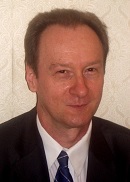
Plenary Lecture
Medical Image Processing Optimization Problems

Professor Milan Tuba
Singidunum University
Serbia
E-mail: tuba@ieee.org
Abstract: Digital images revolutionized the way we live and work. The photography 20 years ago was completely different with chemicals, special papers, etc. and today everything is in digital form and it is much easier to make and process images. Digital images are not used only for fun in everyday life but also for much important things like medical diagnostics. X-ray imaging exists for over a hundred years and it represents a diagnostics revolution because it gives the possibility of seeing the inside off the human body. However, analyzing X-ray images by human expert’s naked eye was very difficult since it depended on physicians’ eyes and their ability to spot the anomaly in a pale image. With digital images, it is a completely different procedure since numerous digital filters can be applied in a fraction of a second, automated analysis and detection of anomalies that are not visible by naked eye are possible, etc. This is also the case with other types of medical images introduced later such as ultrasound, magnetic resonance imaging (MRI), positron emission tomography (PET) scan, computed tomography (CT), scintigraphy, etc. Some of the most common tasks in medical image processing are image enhancement, segmentation, image registration, compression, etc. In such processing hard optimization problems can occur. Hard optimization problems cannot be solved by deterministic algorithms in reasonable time so different heuristics and metaheuristics are needed. One of the promising group of algorithms is nature inspired algorithms, especially swarm intelligence algorithms. Numerous swarm intelligence algorithms have been developed and they were adjusted and applied for different medical image processing problems. Some successful applications of swarm intelligence algorithms to the medical image processing problems will be presented in this plenary lecture.
Brief Biography of the Speaker: Milan Tuba is the Vice-Rector for International Relations at Singidunum University, Belgrade and Head of the Department for Mathematical Sciences at State University of Novi Pazar. He received B. S. in Mathematics, M. S. in Mathematics, M. S. in Computer Science, M. Ph. in Computer Science, Ph. D. in Computer Science from University of Belgrade and New York University. From 1983 to 1994 he was in the U.S.A. first as a graduate student and teaching and research assistant at Vanderbilt University in Nashville and Courant Institute of Mathematical Sciences, New York University and later as Assistant Professor of Electrical Engineering at Cooper Union School of Engineering, New York. During that time he was the founder and director of Microprocessor Lab and VLSI Lab, leader of scientific projects and theses supervisor. From 1994 he was Assistant Professor of Computer Science and Director of Computer Center at University of Belgrade, from 2001 Associate Professor, Faculty of Mathematics, University of Belgrade, from 2004 also a Professor of Computer Science and Dean of the College of Computer Science, Megatrend University Belgrade and from 2014 Dean of the Graduate School of Computer Science at John Naisbitt University. He was teaching more than 20 graduate and undergraduate courses, from VLSI Design and Computer Architecture to Computer Networks, Operating Systems, Image Processing, Calculus and Queuing Theory. His research interest includes heuristic optimizations applied to computer networks, image processing and combinatorial problems. Prof. Tuba is the author or coauthor of more than 150 scientific papers and coeditor or member of the editorial board or scientific committee of number of scientific journals and conferences. Member of the ACM, IEEE, AMS, SIAM, IFNA.